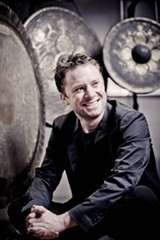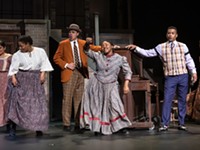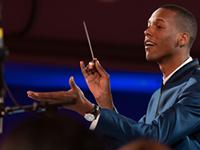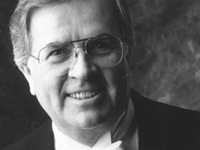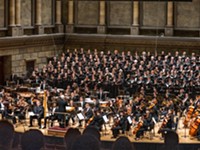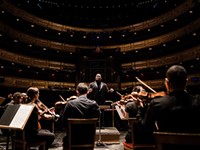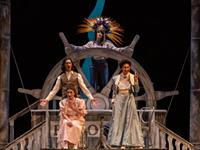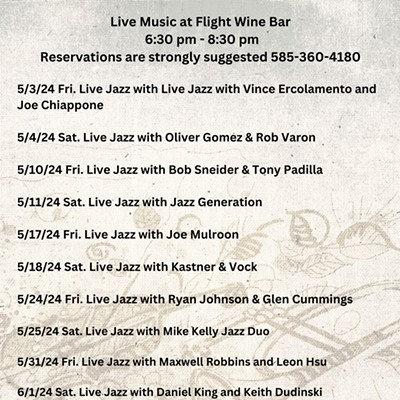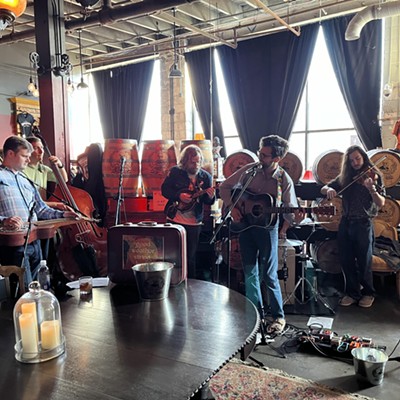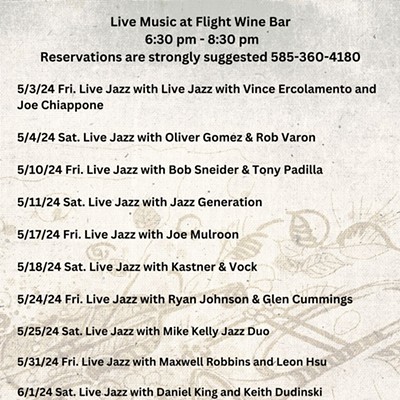[
{
"name": "500x250 Ad",
"insertPoint": "5",
"component": "15667920",
"parentWrapperClass": "",
"requiredCountToDisplay": "1"
}
]
The Rochester Philharmonic Orchestra's Festival of American Music this month looked good and paper, and in its two Kodak Hall concerts it sounded even better. This weekend's final concert, in which Ward Stare leads a very entertaining recent concerto by Jennifer Higdon along with two terrific, not-quite-standard-repertoire scores by Barber and Copland, was a powerful culmination.
With their wide range of color and rhythmic incisiveness, these works all played well off each other, showing Stare's flair for programming and the orchestra's flair and virtuosity for playing American music of all styles and flavors. The same, by the way, was true for the previous week's American Music Festival concert, which included music of Williams, Gershwin, Bernstein, and Ives, as well as a fantastic performance of John Adams' fantastic "Doctor Atomic Symphony."
Ward Stare has described Samuel Barber's First Symphony as "doing everything a Mahler symphony does in 20 minutes." Similarly, the composer's "Medea's Meditation and Dance of Vengeance" does almost everything Stravinsky's "Rite of Spring" does in 12 minutes (with perhaps a foreshadowing of "West Side Story" thrown in). This piece is not performed much; until last night, the RPO hadn't played it in 30 years. But it's a humdinger - and its acidic orchestration and rhythmic ferocity are not very typical of the composer of "Adagio for Strings."
Stare's affinity for Barber's music definitely came through in a well-paced, rhythmically assured, and downright exciting performance, from the subtle menace of the opening to the raucous "Dance of Vengeance" - in which the composer of "Adagio for Strings" gives out with some snappy yet sinister boogie-woogie piano. Who knew?
"Raucous" is not exactly the right word to describe so finely tailored a work as Jennifer Higdon's Percussion Concerto, but it does make some infectiously joyful noise. It's a tremendous showpiece for a nimble percussionist, and Colin Currie, for whom Higdon wrote it, absolutely has this piece in hand, so to speak. Higdon calls for what looks like dozens of drums, woodblocks, cymbals, and what Ralph Vaughan Williams referred to as "'phones and 'spiels" - played by the soloist and doubled by the orchestral percussion section, with imaginative use of antiphonal effects.
The concerto starts out quietly with seemingly random tremolos on the marimba, quickly settles into a groove, and seldom leaves it. Currie's brilliant performance climaxed with a pretty amazing cadenza for drums and cymbals - even more amazing considering it was happening at an RPO concert and not a rock concert. Higdon's concerto may not be a masterpiece, but it is a ton of fun, an aerobic workout for the soloist, and markedly eclectic in its happy grabbing of rhythms from rock, Latin music, Broadway, and a lot more. What could be more American than that?
Aaron Copland's Third Symphony, that's what, especially in a performance as committed as this one. This is Copland's major instrumental statement: a very public celebration of the end of World War II and a summing-up of his "American sound" (his 1930's and '40s sound, anyway). The composer's quotation of his "Fanfare for the Common Man," and its transformation into an orchestral juggernaut in the finale, tells you all you need to know.
This must be one of the most demanding symphonies in the repertoire to play, but this RPO performance could hardly have been better - solid as a rock with terrific brass playing in the "Fanfare" portions and everywhere else, and very confident strings: the violins in particular in this work play many high-flying, exposed passages that have to be absolutely in tune, as well as many extremely syncopated fast passages. Copland does occasionally go overboard - I once heard the finale of this symphony described as a "sonic assault." But some of the symphony's best passages also show Copland at his most inward and reposeful - the delicate opening gestures, the middle section of the scherzo (deliciously played by the RPO woodwinds), and almost all of the slow movement, for example.
Copland's Third Symphony has always tended to be slightly dismissed, even by its great interpreter, Leonard Bernstein; but it is a rich, and yes, deeply American work, and this performance brought out its true colors. If the RPO continues these American Music Festivals (and it better), I hope we'll hear other wonderful, ignored American symphonies, by Walter Piston, William Schuman, David Diamond, and many more.
